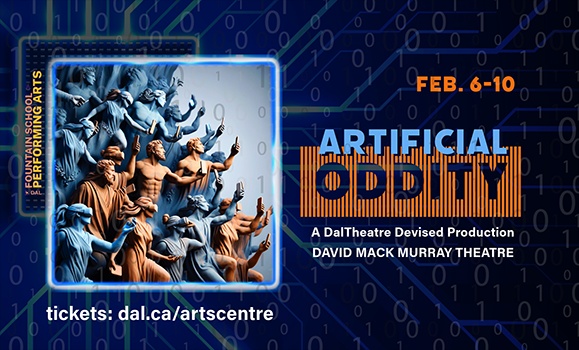As artificial intelligence becomes more present in school and in life, third-year acting students in the Fountain School of Performing Arts have come together to create Artificial Oddity — a devised theatre piece that takes a critical look at technology through time.
This bold new work will be performed in the David Mack Murray Studio from Feb. 6-10 at 7:30 PM, with an additional matinee at 2 p.m. on Feb. 10.
The advent of artificial intelligence, or AI, is all over the news these days as people wonder and debate what effect this new technology will have on human life. In Artificial Oddity, the students imagine similar conversations throughout history around previous technologies now part of our daily lives.
“We're looking back across time, examining a few key technological advances and the debates that happened around them, and jumping through time back to the present moment,” says Matt Walker, an assistant acting professor in the Fountain School and the play’s director.
Artificial Oddity is a devised piece, meaning that there was no set script at the beginning of its creation. Instead, Walker and Hal Rotman, assistant director and dramaturg, had the actors argue for or against a few key technologies in formal debates. The play grew from these original debates through collaborative creation and improvisation.
“We’re sort of sticking to that format throughout,” says Liam Oko, one of the actors. “So we have both the positive and negative aspects of each technology that we talk about.”
The play will have scenes about technologies like the internet and the automobile, all the way back to the invention of the wheel and fire.
Get tickents now: Dal Arts Centre
First fire
The story of that first fire is central to Artificial Oddity’s themes. The Greek myth of Prometheus, who stole fire from the gods and gave it to humans, is presented and reflected upon throughout the different scenes.
Student actor Bailey Nash, who plays Prometheus, says, “He believes that human beings will one day overtake the gods, and he gets punished eternally for this.”
As Walker explains, “We’re exploring the possibility that technology or computers are stealing our fire at present with how we're pouring all our intelligence and our information into them.”
Will AI one day overtake humans the way fire helped humans overtake the gods? Or will it become as ubiquitous as the wheel?
The scenes and characters that the class has created might not be what you’d expect. Oko is playing Al Gore, the former vice-president of the United States under President Bill Clinton, in a comedic scene imagining conversation around the pros and cons of the early internet between Gore and Clinton.
“We’re playing with…what are the political implications of this? Should these political figures be the ones that are making these decisions for us?” says Oko.
Another scene imagines a prehistoric man, played by Lorenzo Castro, who refuses to use the newly invented wheel. Castro enjoyed creating a character hard for modern people to imagine.
“There was no historical basis for someone who was against the wheel. So I was both cursed, but also blessed with having much more freedom in terms of how I was characterizing this man,” he says.
A rewarding experience
Creating an entirely new play has been a challenging but rewarding experience for the actors.
“You have such little time, but have to acknowledge that through the process, things will come,” says Bailey Nash, another student actor. “The thing that you create in the first week is not going to be the end product.”
Walker believes that the strong foundation of the debates has allowed for excellent work.
“I feel good that I presented a question that everyone has strong opinions about one way or another,” he says. “That’s what I look for with the devised show. And the students come with a lot of great invention and great humour.”
To create many different time periods and places, the play uses innovative set design from Tamara Kucheran and costumes by Costume Studies student Sarah Cooper.
The set is imagined as a temple to Prometheus that humanity is returning to, but as student Lorenzo Castro says: “While it’s a temple in the beginning, later on in the show it can turn into many different things.”
Similarly, “Each vignette has a radically different look, which is a great challenge for our costume designer,” says Walker.
A moment of pause
While the play travels from ancient Greek myth to the modern discussion of AI and back, songs by legendary performer David Bowie will be interspersed, with live music from music student Jeremie Boudreau.
“He was somebody who had a lot of comments about and had a big influence on technology while he was alive, and a lot of his songs reference that,” explains Oko on why Bowie’s music was chosen.
With AI as the current transformative and controversial technology, there has been some critical engagement with generative AI to see what role it could have in writing the show. However, everyone notes that their own human creativity has always been needed, and the joy of devising work together as people.
“Seeing something from the start and going all the way to the end with it, really just building something up from nothing has been incredible,” says Nash.
“The thing I want the audience to take away is that this is a timestamp,” says Oko. “I want this to be a moment of pause for them, to come away thinking about what's ahead.”
Tickets to Artificial Oddity are available at the Dal Arts Centre Box Office.

